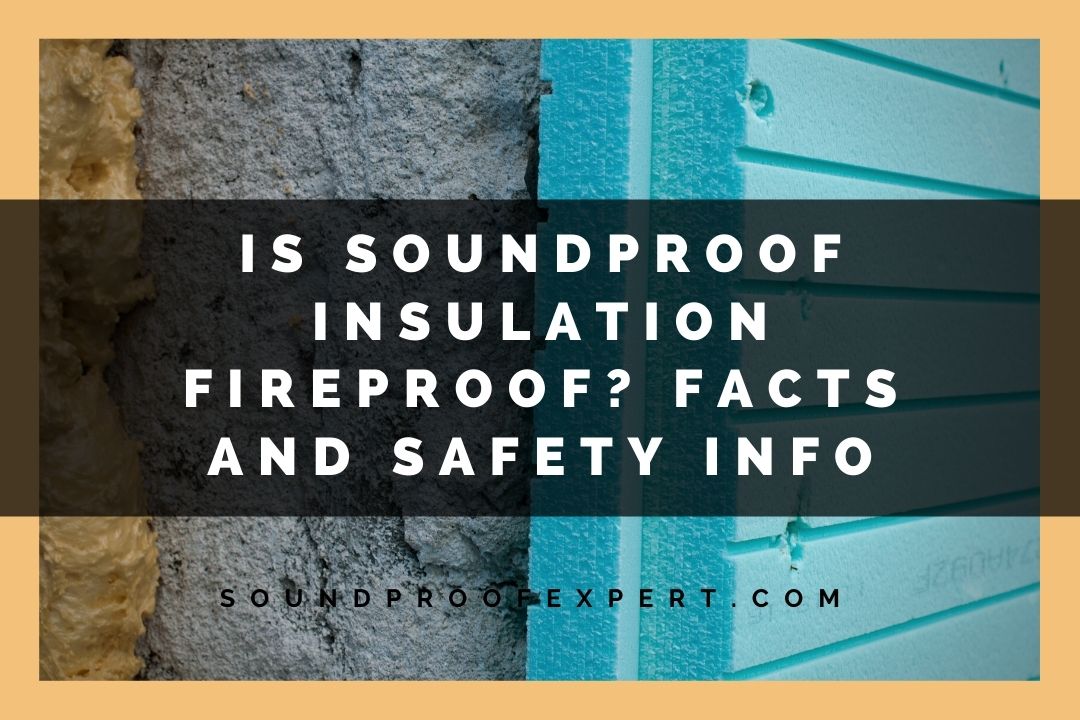
There are plenty of reasons you might be using soundproof insulation, such as for a home-based studio. Some people living in heavily populated areas might also opt for sound dampening insulation for added comfort. But is it fireproof, and should you use it?
Some soundproof insulation is fireproof, though it does depend on the type of material used. The most fire-resistant insulations are mineral wool or fiberglass, which can help reduce sounds but won’t wholly soundproof an area. If soundproofing is your top priority, you also need acoustic panels.
Insulation alone isn’t the best way to soundproof a home, but it can help reduce the sound transmissions and muffle noises. The rest of this article will detail some topics related to this subject, including fireproof versus soundproof insulation, the best insulation for fireproofing and soundproofing, and some important safety tips and facts.
Fireproof vs. Soundproof Insulation
Fireproof and soundproof insulation are two different products that serve different purposes.
For example, fireproof insulation is made from fire-resistant materials, like fiberglass, and can help a structure survive in a fire.
On the other hand, soundproof insulation helps reduce the noise heard inside the home or are from outside sources while simultaneously trapping sounds and minimizing their noise level on the outside.
When selecting a suitable insulation material, it’s crucial to think about your home and your unique needs. I’d also recommend consulting with a construction professional before installing insulation.
Fiberglass Insulation Is the Top Choice for Fireproofing
As mentioned above, fiberglass is the most common type of fireproof insulation. Fiberglass insulations have been rigorously tested for safety over the years and remain the top option for many home builders and homeowners who want to install fireproof insulation.
Fiberglass is also great for reducing the amount of sound transmission in your home, but it won’t wholly soundproof the space.
Soundproofing vs. Sound Dampening
It’s important to consider what you mean and want when you say “soundproof.”
For different people, soundproof could mean lessened sounds, while for others, it means creating a space entirely impervious to sound.
If you’re looking to simply dampen the sound in your home and reduce noise transmission, insulation could be the perfect solution for you. I’d recommend using fiberglass insulation, as it’s tried and tested.
However, if you want a genuinely soundproof space where no sound escapes or enters, you’ll have to do more than just insulate. In this case, you’ll need soundproof panels and other materials.
Total Soundproofing
If you want an utterly soundproof space, I would advise using a combination of insulation and soundproofing materials.
Foam insulation is the best for soundproofing an area because soft surfaces absorb sounds more readily than hard surfaces. However, foam insulation can be flammable and won’t hold up in the event of a fire.
In addition to the foam insulation, though, you’ll likely also have to purchase acoustic panels, rugs, and other sound-absorbing materials to create a soundproof area.
What Insulation Is Best for Fireproofing?
Insulation works as a protective blanket, coating your home with a secure barrier against heat transfer. For many homeowners, fireproof insulation is vitally important. If this sounds like you, you might be wondering what insulation is best for fireproofing.
The best insulation for fireproofing is fiberglass. This material is made from glass spun into fibers and then conjoined with plastic polymers. Fiberglass has natural fireproof characteristics but can ignite if the product is backed with paper or foil.
Other fire-resistant insulation options include mineral wool, fibrous mats, and cellulose. While not all of these are entirely fireproof, they afford some fire retardant qualities.
Mineral wool is excellent fireproof insulation. Of course, this product can vary in materials used to produce it. But, whether it’s made from actual mineral rock or recycled materials like iron and steel by-products, it has a natural immunity to combustion.
Fibrous mats and cellulose also offer some non-combustible qualities, but they’re not entirely fireproof, and fibrous mats can have some health concerns associated with them.
What Insulation Is Best for Soundproofing?
Homeowners can be quickly disappointed when trying to soundproof a home or room in their house if they don’t have the proper expectations. Remember that there’s a difference between soundproof and sound reduction.
The best insulation for soundproofing is either fiberglass batts or foam insulation, as they can reduce sound transmissions. However, for proper soundproofing, you’ll need to include other materials, such as foam panels inside the room.
According to RetroFoam of Michigan, foam insulation can reduce sound by about 80%.
Insulation Safety Tips and Facts
Health and safety are usually at the top of most homeowners’ priorities, especially when installing insulation. So, it’s natural for many consumers to seek flame-resistant products that are also well-tested for safety and health.
Earlier in this article, I discussed some available non-combustible and preferred sound-reducing insulation options, including fiberglass, mineral wool, cellulose, and spray foam. While fiberglass and mineral wool are great fireproof options, cellulose and spray foam are combustible but preferred for soundproofing projects.
Beyond their fire-resistant properties, though, you should also consider the potential health risks each of these products has.
Fiberglass and mineral wool are the most thoroughly tested insulation materials available. In addition, the materials have proven thermal and acoustic properties that are also not classified as carcinogens.
However, cellulose and spray foam have some concerning qualities. Mainly, cellulose and spray foam insulations lack sufficient testing, so it’s difficult to know what health concerns are. Still, some research suggests that the chemical components of these materials can pose health risks to one’s lungs from dust inhalation and potential asthma.
Other risks associated with these products relate to health hazards related to corrosion and mold. Fiberglass, mineral wool, and spray foam are all inorganic, so there’s no risk of mold growth when using these products. However, the same can’t be said of cellulose products made of natural materials that can act as food for mold growth.
The other concern is corrosion. The insulation you put in your home can significantly impact possible pipe corrosion, so choose wisely and do your research!
Conclusion
From a technical standpoint, soundproofing insulation can be fireproof if your selected insulation is one of the following products:
- Fiberglass
- Mineral wool
However, from a practical standpoint, insulation alone isn’t enough to soundproof your home completely, but it can offer some sound reduction.
Choosing the proper insulation depends on your needs and goals. For example, if you’re looking to soundproof your home or space completely, you’ll need not only insulation but other acoustic materials and a potential home remodel.
On the other hand, fiberglass is an excellent choice if you’re more interested in fireproof insulation with sound minimizing capabilities.
